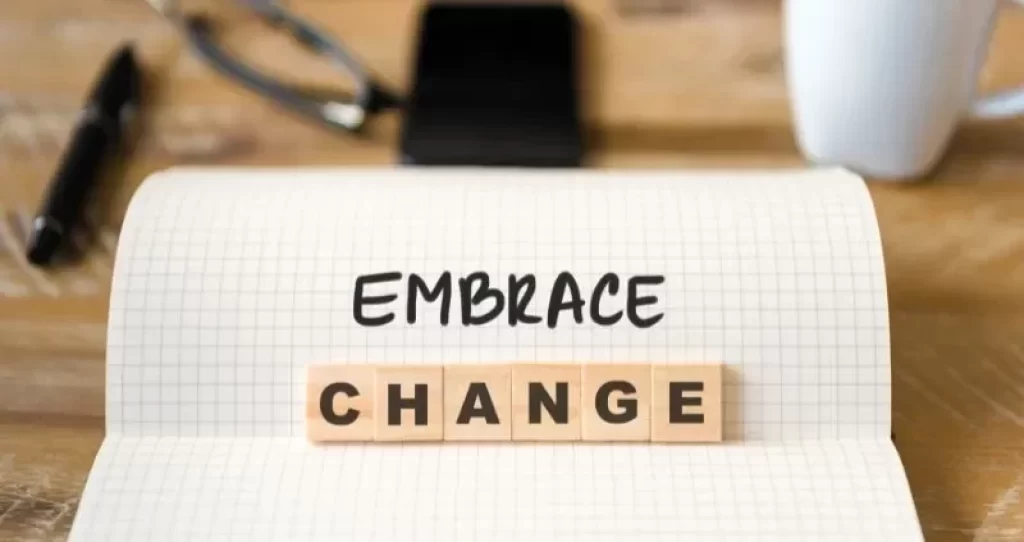Change is an inevitable and constant part of life, impacting every aspect of our existence. From career shifts and relationship adjustments to unexpected life events, change can evoke a range of emotions and challenges. In this blog, we’ll explore the effects of change on our mind, brain, and body, debunk some myths, present facts, and offer practical solutions for navigating life transitions with grace.

The Effects of Change on the Mind, Brain, and Body
Impact on the Mind:
Change often triggers a cascade of emotions such as anxiety, fear, and stress. The uncertainty of what lies ahead can lead to overthinking and a sense of loss or grief for the familiar. The mind may resist change, clinging to the comfort of the known, which can hinder adaptability.
Effects on the Brain:
Neuroscientific studies reveal that change activates various regions of the brain, including the amygdala responsible for processing emotions, and the prefrontal cortex associated with decision-making. These changes can disrupt cognitive functions, leading to difficulty concentrating, memory lapses, and impaired judgment during transitional periods.
Impact on the Body:
The body’s physiological response to change is often characterized by increased levels of stress hormones such as cortisol and adrenaline. This heightened state of alertness can manifest as disrupted sleep patterns, changes in appetite, and physical symptoms like headaches or muscle tension. Prolonged stress may contribute to a weakened immune system and other health issues.
Myths and Facts about Coping with Change
Myth 1: Change is always negative.
Fact: While change can be challenging, it also opens doors to new opportunities and personal growth. Viewing change as a chance for positive transformation can shift one’s perspective.
Myth 2: People should adapt to change effortlessly.
Fact: Each person copes with change differently. It’s normal to experience a range of emotions, and adaptation is a gradual process. Accepting one’s feelings and seeking support can facilitate a smoother transition.
Myth 3: Change only affects the mind.
Fact: Change has a holistic impact on mind and body. Recognizing the interconnectedness of mental and physical health is crucial for effective coping strategies.

Solutions for Coping with Change
Change, though inevitable, doesn’t have to be a source of overwhelming stress. By understanding the effects of change on the mind, brain, and body, and debunking common myths, we can pave the way for effective coping strategies. Let’s delve into more details about practical solutions for navigating life transitions with grace.
1. Embrace Change as an Opportunity:
Rather than resisting change, consider it as an avenue for personal and professional growth. Shift your focus from what you might be losing to what you could gain. Identify the positive aspects that the change might bring, such as new experiences, skills, or relationships. This positive mindset can act as a powerful tool in adapting to and thriving during transitions.
2. Build Resilience:
Resilience is the ability to bounce back from challenges. Cultivate this quality by incorporating mindfulness and stress-reduction techniques into your daily routine. Practices like meditation, yoga, or deep breathing exercises can help regulate your emotions and create a sense of calm. Additionally, developing a problem-solving mindset can enhance your adaptability in the face of change.
3. Establish a Support System:
Human connection is a fundamental aspect of coping with change. Share your thoughts, fears, and aspirations with a trusted support system of friends, family, or colleagues. Not only does this provide emotional validation, but it also offers diverse perspectives and insights. Sometimes, an outside viewpoint can illuminate opportunities or solutions that might not have been apparent on your own.

4. Prioritize Self-Care:
The mind and body are intricately connected, and taking care of your physical well-being is paramount during times of change. Ensure you maintain a balanced diet, engage in regular physical activity, and prioritize sufficient sleep. These habits contribute to overall emotional stability, making it easier to confront the challenges that come with transitions.
5. Set Realistic Expectations:
Change is a process, not an event. Accept that adapting to a new situation takes time and effort. Set realistic expectations for yourself, acknowledging that you may experience a range of emotions. Be patient and compassionate with yourself as you navigate through the different phases of the transition. Celebrate small victories and progress, no matter how incremental.
6. Seek Professional Guidance:
If the challenges associated with change become overwhelming, consider seeking professional guidance. Therapists, counselors, or life coaches can provide valuable tools and strategies to help you navigate the emotional and psychological aspects of transitions. Professional support offers a structured and tailored approach to coping with change.
7. Explore Biofeedback Techniques:
Biofeedback involves monitoring physiological responses such as heart rate, muscle tension, and skin conductance to gain awareness and control over these bodily functions. This self-regulation technique can be instrumental in managing stress and anxiety during transitional periods.

Conclusion:
Navigating life transitions with grace requires a holistic approach that encompasses the mind, brain, and body. By embracing change as an opportunity, building resilience, establishing a support system, prioritizing self-care, setting realistic expectations, and exploring innovative techniques like neurofeedback, photobiomodulation, and biofeedback, you can not only cope with change but also emerge stronger and more adaptable. Remember, change is not the end but a new beginning, and your ability to navigate it with grace will contribute to your personal growth and well-being.
Elumind Centres for Brain Excellence is an integrated mental health centre offering solutions that can help you with your mental/brain health needs. To start your journey, book your FREE 15-MINUTE PHONE CONSULTATION. We are here for you.









